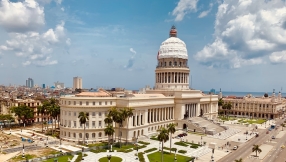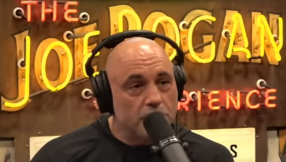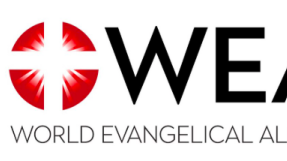Interview: Mercy Ships VP on Gospel's Healing Touch, African Superstition
Dr Glenn Strauss, the vice president of International Health Care and Programs, spoke to our correspondent on July 12 just days after returning from performing surgeries aboard the Africa Mercy docked in Monrovia, Liberia.
The following are excerpts taken from the interview:
|PIC1|I usually hear Mercy Ships performing cataract and cleft palate surgeries, but this was the first time I heard of orthopedic surgeries (surgery onmusculoskeletal ailments such as arthritis) being done on a Mercy ship. Is this the first time the ministry has done orthopedic surgeries?
Strauss: No, this is not the first time, but it has been several years since one of our ships have been able to sponsor and support orthopedic surgeries. So we are thrilled that the Africa Mercy will make it possible for us to support more variety of surgeries than we have been able to do before and orthopedic is one of those.
You said you weren't able to have orthopedic surgeries for several years. What made it difficult for other ships to host these procedures?
Strauss: Space restrictions. Orthopedic is a sophisticated, equipment-heavy type of specialty. It requires certain types of X-ray equipments and large tools required to do that type of work. So it was very difficult to accommodate that when we were dealing with makeshift operating room space.
But the Africa Mercy, on the other hand, is all-purpose built. The operating rooms are all very generously spaced in their proportions. They were designed to give us the space to be able to carry out some of these kinds of work.
What specific kinds of orthopedic surgeries will Mercy Ships be offering?
Strauss: Our emphasis is going to be patients who have been suffering from long-standing, debilitating conditions. So we expect it will be primarily for those who have old injuries - bones that have been broken or motor vehicle injuries that were never tended to (in other words, the bones were never set properly so they are not able to walk on the leg that was broken or it may be distorted or misshapen) - or hands that are not functional because the arms that have been broken were never set correctly; those types of procedures.
One other type of procedure is dealing with children with the condition of club feet - where their feet are actually misdirected. It is a congenital condition where procedures can be done to restore the feet to the proper alignment and that allows the children to have normal mobility.
So even though it may be years and possibly decades that a person's bones were not being set correctly, you can still correct that after such a long time?
Strauss: Yes, and it requires again the orthopedic specialty. Though it is an unusual problem for them to deal with (of course being from the developed world), it is certainly something well within the range of what can be accomplished on the ship.
What is one of the most severe cases you've dealt with in terms of plastic surgeries?
Strauss: On the Africa Mercy, I was there to start the eye surgeries a couple of weeks ago. We've done VVS (vulvar vestibulitis syndrome) surgeries on the new ship now and orthopedic has done their first case, but we haven't yet done our first maxofacial case on this ship. That will be in another few weeks until we start that.
But in the past, one of the worst cases I've seen was a 7-13 pound tumor, a huge tumor, on the face of this young man that had distorted his face for years. He had to walk around with it sort of draped so that it wouldn't scare people away and he was pretty much an outcast.
Which country was this in?
Strauss: I believe this was in Sierra Leone.
What were some of his reactions after the tumor was removed and how long did the surgery take?
Strauss: The procedure itself took some hours to accomplish what was desired. It is not unusual either in some of these cases that it might be done in a couple of stages. First stage is to remove the growth and set things generally in the right condition. Then we do the reparative procedure to restore some functions; so it is not unusual for it to take several stages to get everything in a way that's functional.
In his case it took some hours to get this tumor removed and his reaction was one of disbelief at first. It sort of goes in stages with these patients. First of all, right after surgery they can hardly believe it is really gone; they lived with this for years. They look in the mirror and they have this disbelief that it's really gone. They even reach up to touch the area where the tumor used to be to prove to themselves that it is not there. And then what happens, as they come to understand the impact of what happened - that it is gone now - the celebration starts.
The first patient I did a couple of weeks ago I had removed a cataract and she could see right after the operation. She came down the hallway dancing. (Laughs) It was remarkable. They don't all do that but she did. (Laughs) But it is an amazing experience to see the joy that these people so unreservedly express. No reservation - dancing down the hall or singing at the top of their lungs. Sometimes they get all the patients on the floor and they all sing. (Laughs) It is quite a sight. It is quite the experience to see that.
Why are there so many extreme cases [of tumors and other extreme facial deformities] in Africa?
Strauss: I think medical conditions like these exist everywhere. But when the access to medical care has been disrupted for a significant period of time then what happens is these conditions which normally stay small and insignificant become overwhelming.
So I would say that the extreme severity of the conditions we see and the overwhelming prevalence of these unusual types of problems stems from one primary root cause - and that is lack of access to medical care.
There are rare African conditions which you don't normally see outside of Africa, but the things we are talking about working on exist because some minor condition didn't get attention and resulted in a 7 lb growth. It is a benign tumor but it has gotten so large that it threatens his life.
Do you also have your own private practice in the United States? In what way does the reaction of patients in the US differ from your patients in Africa and has that influenced your decision to work for Mercy Ships?
Strauss: I'm full-time Mercy Ships now. I had an ophthalmology practice up until December 2004 and then joined Mercy Ships full-time in January 2005. I've been working with Mercy Ships for ten years now all together using vacation time to do so since 1997.
What I saw in my experiences during my short trips prior to leaving my practice was the sincere gratitude that these patients would express. It is the type of gratitude you see in someone who is truly desperate for any type of help. But they didn't just get some help but was cured.
It is the patient who was blind who doesn't just receive a little of their vision back but they got perfect vision now. The type of gratitude that they express is unreserved, full of joy and it was an expression to me of the real joy of doing medical care in the first place. The thing you really went into the business for - to impact a life. To see that visibly in the eyes of the patients or seeing them dance down the hall, seeing them hold their hands in the air and sing - those are the type of things that is a blessing to me.
I read that some of these patients who have physical deformities are often outcasts not only in society but even within their family. Why is this?
Strauss: That is an interesting question. It is because of the belief system in Africa is so strongly animistic. The fact that they have a defective child means that that child should be shunned or it could cause grief to the whole family. So they see it as protecting the family by rejecting the deformed child because this belief is so strong.
It is not that they don't value life; that's not what it is about. They see it as survival of the whole family. Their community is very family-oriented and they survive because they live in communities and tribes. So if they have a child that is deformed or has a serious condition of some sort - a cleft lip - because of their belief system they think it is harmful to the rest of the community and the family in particular. So the child would be an outcast as a result.
Do they think the child is possessed by an evil spirit or why exactly does the family think the child is harmful?
Strauss: I'm glad you asked that. That is correct. They think either some evil spirit has done this to the child or the child is actually possessed by the evil spirit. In either case it is dangerous for the family. 'If the evil spirit did this to this person, then why wouldn't it happen to one of us?' It is the obvious concern they have. That child needs to be ostracised to protect the family.
Mercy Ships is a Christian organisation. How is the Gospel message being conveyed through the works of the ministry? Does the ministry do evangelistic activities through community outreaches such as giving out Bibles?
Strauss: Several different aspects are the answer to that question. I like how you stated the question as how is the Gospel shared by what we do - it is an interesting way to ask the question actually because in fact one of the biggest factor of our being able to communicate the message is through what we do.
Let me give you an example of these women that was just on the ship a couple of weeks ago. There were six women who had a condition where they were chronically incontinent of urine because of a child birth injury that occurred because they didn't have access to medical care for the delivery of their child resulting in this condition.
Well, they are on the hospital ward and the staffs had the chance to just get to know these patients. So what they get to do is just sit with them and they'll chat with them and tell them stories of their own lives. Often times those stories will include what they have done, but also they include stories on what God has done in their own lives.
The thing that makes the biggest difference is not the stories themselves but the fact that these women who have been outcast - they may not have had human touch for 8-10 years - just imagine that! They might not have had human touch for 8-10 years and now there is someone sitting next to them on the bed. They're sitting in a puddle of urine because they are chronically leaking and they have a staff member sitting their holding their hands.
It is very common for a patient to say that the care that you show me, just caring and the human touch I had here, I am convinced that there must be a loving God for this to be possible. That is how they say it. Often times in a different language, but that is what they say. (Laugh) This caring touch that I received, it's clear that God is not evil and angry as I have thought. There must be a loving God.
Well, guess what, that opens up the door to explaining about a loving God. Then we can say we are here because He has loved us and it is just the chance for us to share that love with you and that opens them up wide to the Gospel.
And out of those six ladies all of them are Muslims. Four of them chose to follow Jesus as a result of this experience. It wasn't because we had a Gospel tract to give them or were handing them a Bible at the door or anything like that. It is because we sat on the bed with them and touched their hands and told them that there is a loving God and they saw that in what we did. That is the main way the Gospel message is communicated - the touch we give to the outcast people and taking care of people no one else will have anything to do with.
We do show the Jesus Film and we do hand out Bibles by the way. But those are support things and aren't the primary means we use.
This community that we are [currently] in is a community that no one has ever paid attention to before. Why are we there? That is there question. (Laughs) It is because God is a loving God and He has enabled us to come here for you. We would love to tell you about Him.













